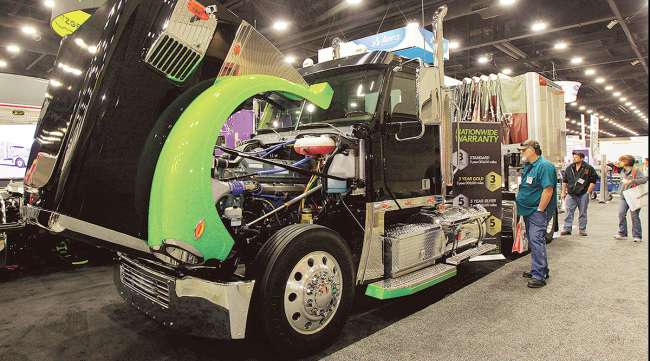Senior Reporter
Tennessee University Investigating Possible Research Misconduct in Glider Vehicle Testing

Officials at a Tennessee university are investigating allegations of possible research misconduct in connection with a glider vehicle emissions study that concluded glider vehicles with remanufactured engines do not pollute the air any more than heavy trucks with newer engines.
The Tennessee Tech University study, funded by Fitzgerald Glider Kits of Crossville, Tenn., was used in part to buttress a proposal by the U.S. Environmental Protection Agency to repeal an Obama administration regulatory provision that closed a loophole regarding production of new gliders with older engines that do not comply with current emissions limits.
The glider provision, included in EPA’s 2016 Phase 2 heavy truck greenhouse gas emissions rule, limits the number of non-emissions compliant gliders built by each company to 300 a year, and requires the gliders beyond that number to be certified as emissions-compliant for the model year they are built.
Our Tennessee Tech community shares the desire to ensure the academic research integrity of the university along with our reputation as an honest broker of knowledge and research initiatives.
Tennessee Tech President Phil Oldham
EPA Administrator Scott Pruitt has argued that gliders are not new trucks and therefore should not be regulated by EPA. But in a Nov. 17 EPA proposed rule, the agency noted that the Tech study supported a petition by glider makers Fitzgerald, Harrison Truck Centers Inc. and Indiana Phoenix Inc. because it “showed that remanufactured engines from model years between 2002 and 2007 performed roughly on par with OEM certified engines,” and ‘‘in some instances even out-performed the OEM engines.’’
However, that conclusion seemed questionable to some members of the university’s faculty, including Holly Stretz, a professor of chemical engineering and member of the faculty senate, who called on the university president to initiate an inquiry.
EPA PROPOSES REPEAL: Says it lacks authority to regulate gliders

Stretz
“I’m not an expert in diesel mechanics but the burden of proof for such a claim would be pretty extensive,” Stretz told Transport Topics. “That was the smoking gun.”
In a Feb. 15 statement, Tennessee Tech President Phil Oldham said that to comply with the university’s policy regarding potential misconduct in research he has appointed a research integrity officer to “examine” concerns raised by the university faculty senate.
“Our Tennessee Tech community shares the desire to ensure the academic research integrity of the university along with our reputation as an honest broker of knowledge and research initiatives,” Oldham said in a statement.
The university is not commenting beyond the statement.
Oldham’s action came after he received a Jan. 30 resolution passed by the university’s faculty senate that said “our reputation has recently been damaged because of a study funded by Fitzgerald Glider Kits, and used to influence federal policy.”
The faculty resolution asked that Oldham suspend Tom Brewer, associate vice president of research for the university, pending an independent glider investigation, and that the university end all research activities with Fitzgerald.
At press time, Oldham had not suspended Brewer.
HOT ISSUE: EPA proposal draws battle lines
EPA Administrator Scott Pruitt has argued that gliders are not new trucks and therefore should not be regulated by EPA. But in a Nov. 17 EPA proposed rule, the agency noted that the Tech study supported a petition by glider makers Fitzgerald, Harrison Truck Centers Inc. and Indiana Phoenix Inc. because it “showed that remanufactured engines from model years between 2002 and 2007 performed roughly on par with OEM certified engines,” and ‘‘in some instances even out-performed the OEM engines.’’
However, that conclusion seemed questionable to some members of the university’s faculty, including Holly Stretz, a professor of chemical engineering and member of the faculty senate, who called on the university president to initiate an inquiry.
In comments before the faculty senate, Brewer said that in the spring of 2016 he met with Fitzgerald’s leaders and was told they had no engineers on staff. After the Obama administration proposed changes to the Phase 2 rule, Fitzgerald, the nation’s largest glider builder, said it had never tested its remanufactured engines, and asked Brewer to conduct a test.
Brewer told faculty senate members that in the fall of 2016 he conducted greenhouse gas, particulate matter and nitrogen oxides tests on 13 engines, five of them “brand new,” and the remainder remanufactured Fitzgerald gliders.
“Tests indicated no significant differences in any of the 13 vehicles tested,” Brewer told the faculty senate. The study cost $39,000, he said.
EPA did not rely on the university’s study “for purposes of justifying the proposed regulatory action,” an agency official told Transport Topics Feb. 22. The study, the official added, was “merely mentioned in the background section of the proposed rule since it was attached to the original petition for reconsideration” that was submitted by industry petitioners.
“EPA proposed to revisit the treatment of gliders based on legal and statutory interpretations that are thoroughly explained in the proposed rule,” the official said.
The Tech study conflicts with recent EPA testing that showed gliders to be far greater pollution emitters than new trucks.
In a Feb. 14 supplemental comment on the proposed repeal of the glider provision, the nonprofit Environmental Defense Fund wrote that the Tech study was “at odds” with both recent EPA testing of glider vehicles and emissions factors for model year diesel engines that glider vehicles use.

Roberts
“Our concern is that EPA needs to be basing its decision on accurate and rigorous analysis, particularly as it relates to the pollution impacts from the trucks,” Martha Roberts, a senior attorney with EDF, told TT. “We have really deep concerns about the harmful impacts that would come from these disproportionate levels of diesel pollution.”
Roberts added, “EPA’s testing showed levels of pollution that were multiple times higher for glider trucks versus other new freight trucks. And yet the agency cited the TTU study in its proposal.”
Fitzgerald’s attorney, Joe Depew, told TT that the policy of the university is that “any faculty member can raise their hand and the inquiry starts — for any reason.”
“The suggestion that there’s been something nefarious is well overblown,” Depew said. “The repeal proposal was based upon simply a legal issue [of] whether or not it’s a new truck. It’s not based on Tennessee Tech’s study or anything else, for that matter.”
He called an EPA emissions study completed in November “unauthorized,” and claimed its authors used glider trucks with high mileage and “check engine” lights illuminated.
“If there’s any kind of shoddy test it would be that one, and not Tennessee Tech’s,” Depew said.



